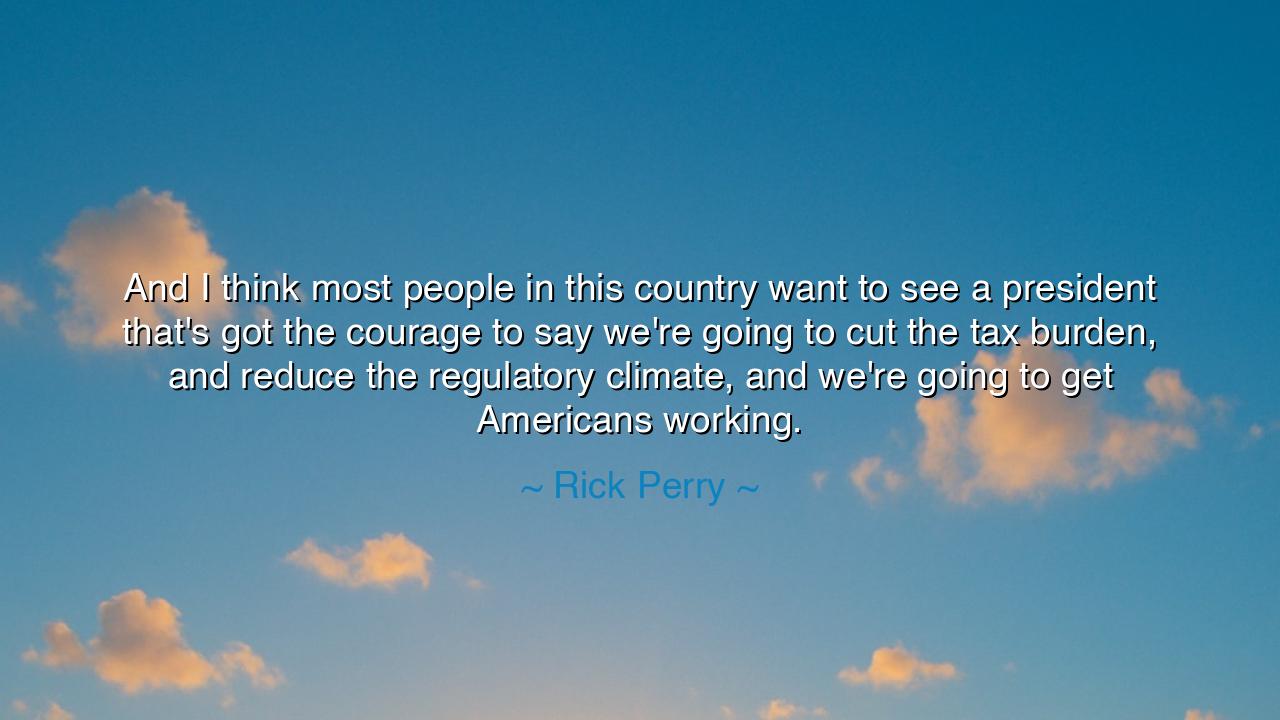
And I think most people in this country want to see a president
And I think most people in this country want to see a president that's got the courage to say we're going to cut the tax burden, and reduce the regulatory climate, and we're going to get Americans working.






“And I think most people in this country want to see a president that's got the courage to say we're going to cut the tax burden, and reduce the regulatory climate, and we're going to get Americans working.” Thus spoke Rick Perry, a statesman echoing the old call of liberty and self-reliance that shaped the destiny of a nation. His words are not merely the language of policy, but of principle — a cry for courage, for freedom, and for the sacred right of human labor to bear its own reward. In this quote, Perry reminds his listeners that the heart of a people’s prosperity lies not in the excess of government, but in the strength of its citizens, free to create, to build, and to rise by the fruit of their own hands.
The origin of such a sentiment stretches back to the dawn of the American Republic, when farmers, blacksmiths, and dreamers cast off the yoke of kings and claimed the right to govern themselves. The Founding Fathers, men like Jefferson and Madison, believed that liberty could not thrive where the people were burdened by heavy taxes or bound by endless regulations. They understood that freedom is not only the absence of tyranny, but the presence of opportunity. In the same spirit, Perry calls for leaders with courage — not the timid courage of rhetoric, but the boldness to act against the tide, to loosen the bonds that hold enterprise and ambition captive.
To cut the tax burden is not merely to lower numbers on a ledger; it is to affirm the dignity of the individual, to say, “You have earned this, and it is yours to keep.” When a nation’s citizens are trusted with their own wealth, they become partners in progress rather than dependents of power. To reduce the regulatory climate is to clear the overgrown path of innovation — to allow the small craftsman, the farmer, the builder, and the entrepreneur to labor without fear of drowning in rules that choke the human spirit. Perry’s vision, therefore, is not one of chaos or neglect, but of restored balance — where government guards freedom but does not smother it, where law protects but does not imprison.
The ancient Romans, too, knew this truth. In the days of the Republic, before emperors ruled with iron decree, Rome prospered under the courage of leaders who trusted their citizens to work, trade, and govern themselves. But when the rulers grew greedy, when taxes rose and laws multiplied beyond reason, the people’s will faltered, and the spirit of the Republic died. Thus, history bears witness: a nation that forgets the strength of its people and turns instead to the comfort of control will soon find both freedom and prosperity slipping through its fingers.
And yet, Perry’s words speak not only to policy, but to the deeper soul of leadership itself. For he calls for a president with the courage to say — not to whisper, not to waver — but to declare openly and stand firm against opposition. Courage in leadership is the fire that kindles the trust of the people. It is the same courage that moved George Washington to cross the Delaware, that carried Abraham Lincoln through the fire of civil war, and that inspired Franklin Roosevelt to lift a nation from despair. Courage is the lifeblood of governance; without it, nations decay into fear and mediocrity.
In this way, Perry’s message transcends the political and becomes moral: a society cannot flourish when it fears risk, when it clings to comfort at the cost of freedom. For no people can be truly happy unless they are working, creating, and striving toward something greater than themselves. Work is not a punishment, but a purpose. It gives meaning to freedom and form to dreams. To get Americans working is not merely to fill jobs — it is to rekindle dignity, self-worth, and the ancient bond between labor and liberty.
Therefore, the lesson is clear: prosperity and freedom walk hand in hand, but both demand courage — the courage to trust the people, the courage to loosen the grip of overreach, and the courage to speak truth even when it offends comfort. In every age, nations rise or fall by whether their leaders possess such courage. And so, the call Perry gives is one that echoes through history: let no government forget that its strength comes from its citizens, not from its power over them.
To those who hear these words today, take this to heart: whether you are a leader or a laborer, a teacher or a craftsman, have the courage to act boldly and the faith to trust in freedom. Build, create, and work not as servants of fear, but as heirs of liberty. For only a people unafraid to strive — unafraid to dream — can renew the promise of a nation and ensure that its light, kindled long ago, continues to shine for generations to come.






AAdministratorAdministrator
Welcome, honored guests. Please leave a comment, we will respond soon